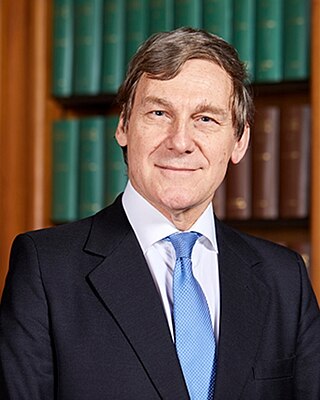Top Qs
Timeline
Chat
Perspective
George Leggatt, Lord Leggatt
British judge (born 1957) From Wikipedia, the free encyclopedia
Remove ads
George Andrew Midsomer Leggatt, Lord Leggatt, PC (born 12 November 1957[2]) is a Justice of the Supreme Court of the United Kingdom, the highest court of law in the United Kingdom.
Remove ads
Education
This section of a biography of a living person does not include any references or sources. (March 2022) |
Leggatt's father is the former Lord Justice of Appeal Sir Andrew Leggatt. Leggatt was educated at Eton College and earned a First-Class Bachelor of Arts degree in Philosophy at King's College, Cambridge in 1979. He was a Harkness Fellow at Harvard University (1979–80) and received a Diploma in Law with distinction from City Law School in 1981.
Remove ads
Legal career
Leggatt was called to the bar (Middle Temple) in 1983 and was appointed a Queen's Counsel in 1997. He joined Brick Court Chambers in 1985, where he practised commercial law, including areas such as banking, insurance, sales, and product liability law.[3] He became a recorder in 2002 and was a deputy High Court judge.[4]
On 26 October 2012, he was appointed to the High Court,[5] receiving the customary knighthood in the 2013 Special Honours,[6] and assigned to the Queen's Bench Division. He was appointed as a Lord Justice of Appeal in February 2018.[7]
In July 2019, it was announced Leggatt would become a Justice of the Supreme Court of the United Kingdom after the retirement of Lord Carnwath. He took the judicial courtesy title of Lord Leggatt and was sworn in on 21 April 2020, in a specially adapted ceremony due to the COVID-19 pandemic. Lord Leggatt recited the judicial oath in the presence of The Lord Reed of Allermuir, the President of the Supreme Court, whilst the other Justices watched remotely.[8][9]
In 2016 Leggatt was elected a Fellow of Eton College.[10]
Remove ads
Cases
- Yam Seng Pte Ltd v International Trade Corp Ltd [2013] EWHC 111 (QB), finding a duty of good faith can be implied in English contract law
- Al Nehayan v Kent [2018] EWHC 333 (Comm), finding that a duty of good faith can be generally implied in law in 'relational' contracts
- Serdar Mohammed v Ministry of Defence [2014] EWHC 1369 (QB), finding the United Kingdom in breach of its obligations under the European Convention on Human Rights, (specifically Article 5). The UK lacks detention authority under international humanitarian law to capture and detain individuals for longer than 96 hours in the course of the non-international armed conflict in Afghanistan.
- Fearn and others v Board of Trustees of the Tate Gallery (2023) UKSC 4,[11] finding that the Tate Gallery's viewing platform was not an ordinary use of land, and hence constituted a private nuisance in overlooking the claimant's residences.
- Philipp v Barclays Bank UK PLC [2023] UKSC 25, finding that banks do not have a duty to prevent their customers from making payments to fraudsters.
- Paul and another v Royal Wolverhampton NHS Trust[12][13] [2024] UKSC 1, finding that psychiatric harm is treated no differently from physical harm in the Law of Torts. Also that doctors do not owe a duty of care to members of the family of their patients to prevent them from harm caused by negligent treatment of the patient.
Notes
Wikiwand - on
Seamless Wikipedia browsing. On steroids.
Remove ads

